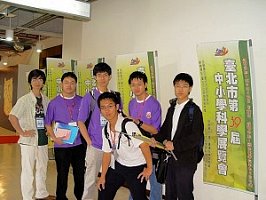Cultivation of Science Talents - Recruitment for First Senior High Science Stream

In light of the development of a knowledge-based economy worldwide, cultivation of talents in various fields has become Taiwan's approach to improving its global competitiveness. As a consequence, the Ministry of Education has made the decision to create science classes in senior high schools to continue with the training of science talents for the country.
In recent years, Taiwanese students have enjoyed remarkable achievements in science and mathematics in major international academic ratings. In "PISA
After long study and discussion, the Ministry of Education has formulated and promulgated the "Guidelines for Recruitment for Senior High School Science Streams and Operation Funding" and the "Ministry of Education Senior High School Science Program Implementation Plan" on Feb. 16, 2009. According to these stipulations, cultivation of science talent is included in regular curricular programming.
By coordinating senior high schools and universities to design the curricula, providing good academic environments and specialized teachers, and screening for students with potential to provide early assistance and eliminate unnecessary learning repetition, students will be able to make better progress through a systematic approach. Thus the objective of cultivating basic science talents for Taiwan can be achieved and the country's global competitiveness can be enhanced.
Six senior high schools have been approved to open a science stream each this year. There will be 30 people in each class, selected from junior high school graduates or 8th graders qualified to take the basic competency test. No more than five junior high senior students with proven outstanding performance and exempt from the competency test can be accepted to each class.
Special Resources, Recruitment and University Admission for Science Stream Students
The particular features of the science stream includes recruitment approaches, curriculum design, as well as a designated advisory mechanism and complementary measures for further education. The students will have no pressure from the university entrance exam.
Senior high schools and universities will coordinate and design the curricula. The program will be divided into two stages. In the first stage the students will take regular basic science subjects as well as humanity science courses and attend intramural examinations for exempted subjects. The second stage includes mostly specialized disciplines. University professors will be invited to give lectures or students may directly take natural science courses in universities and conduct their own research projects under the guidance of university professors.
As to the complementary measures for further education, science stream students are required to study at related university departments after graduating from senior high school. Their grades from the qualification test in each subject and the results of their research projects may be adopted as a basis for evaluation for "multiple criteria for university admission." The credits they earn from the natural science courses taken in universities and their certificates of studies may be used as references for exemption from certain courses after they enter university.
After evaluation, the senior high schools and collaborating universities for the program include Taipei Municipal Jianguo High School (National Taiwan University), the Affiliated High School of National Taiwan Normal University (National Taiwan Normal University and National Yang-ming University), National Experimental High School at Hsinchu Science Park (National Tsing Hua University), National Taichung First Senior High School (National Chiao Tung University), National Tainan First Senior High School (National Cheng Kung University), and the Kaohsiung Municipal Kaohsiung Senior High School (National Sun Yat-sen University).
Attachment(s) for download
- Chinese textChinese text.doc
